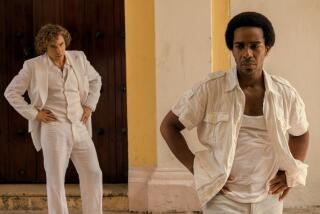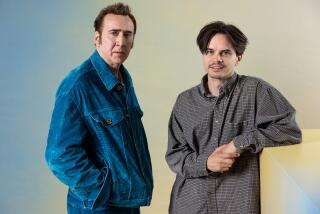Review: Hip-hop and a simmering Mike Colter help ‘Marvel’s Luke Cage’ put the human in ‘superhuman’
- Share via
It takes only about 90 seconds for “Marvel’s Luke Cage,” the latest Netflix series set in the Marvel Comics universe, to address the idea of what it means to be a hero in the black community.
The drama opens at a barbershop in Harlem run by Pop (Frankie Faison), a kind of neighborhood patriarch. The lively conversation has turned to a sign on the wall listing the few highly accomplished, widely revered men -- Muhammad Ali, Nelson Mandela, Michael Jordan -- eligible for free haircuts at the establishment.
Little do most of them know that Luke Cage (Mike Colter), the quietly intense guy sweeping up hair in the corner, has the potential to join this hallowed club (that is, if there were any hair on his head to cut). Thanks to a medical experiment gone awry, Luke has been gifted with superhuman strength and bulletproof skin but would rather fly under the radar than harness his powers for good.
His reticence is understandable. In mourning the death of his wife, Luke knows all too well that, the only way to hurt someone who is physically unstoppable is by hurting the people they love. Introduced onscreen in last year’s “Jessica Jones,” Luke has since relocated to Harlem from Hell’s Kitchen. In addition to working at Pop’s barber shop, he washes dishes at a swank nightclub run by a fearsome gangster named Cornell “Cottonmouth” Stokes (Mahershala Ali).
Luke lives quietly, spending his scarce free time with his nose in the New Yorker. He does his best to avoid romantic attention – though, looking as he does, that’s almost impossible. But when a misstep by one of Cottonmouth’s goons results in tragedy, Luke is reluctantly drawn into the fight against crime.
Like “Jessica Jones,” “Luke Cage” is a show that puts the human in “superhuman.” Executive produced by Cheo Hodari Coker, a former staff writer for the Los Angeles Times who co-wrote the Notorious B.I.G. biopic “Notorious,” “Luke Cage” is a look at what it means to be a hero – and specifically a black one – in a place like Harlem.
Following “Jessica Jones” and “Daredevil,” “Luke Cage” is the third New York-set Marvel adaptation from Netflix. While a familiarity with Marvel mythology and “Jessica Jones” is helpful, particularly in the slower-going episodes before Luke’s backstory is revealed, the series is also designed to be accessible and appealing to neophytes. Even those who are normally allergic to capes and spandex are likely to be intrigued, particularly by Colter’s simmering performance.
Fans of “The Good Wife” will recognize the actor from his recurring role as the ruthless but charismatic Chicago drug lord Lemond Bishop, and he brings the same velvety voice and suave intensity – plus about 30 extra pounds of muscle – to “Luke Cage.”
The supporting cast is equally enjoyable, particularly Alfre Woodard as Mariah Stokes, Cottonmouth’s cousin and a corrupt city councilwoman, and Simone Missick as Misty Knight, a streetwise detective and Luke’s would-be love interest.
See the most-read stories in Entertainment this hour »
“Luke Cage” is directly linked to “Jessica Jones,” but strangely (and probably unintentionally) it also feels like a companion piece to “The Get Down.” Like that Netflix series, which chronicles the dawn of hip-hop in 1970s Bronx, “Luke Cage” features funky musical performances in nearly every episode. The character Luke Cage was introduced in Marvel Comics in 1972, and while the series is set in the present day, it draws from pop culture of the era, most obviously with its groovy, “Shaft”-inspired score. There are nods to hip-hop history throughout, including a portrait of the Notorious B.I.G. that looms over Cottonmouth’s lair, and a cameo appearance by Dapper Dan, the legendary Harlem tailor.
Whereas “The Get Down” shows how run-down neighborhoods became a cauldron for creativity, “Luke Cage” is concerned with what it means to preserve a historically black community that is rapidly being gentrified. Multiple characters talk about the importance of their legacy, and one of Cottonmouth’s henchmen drops references to infamous city planner Robert Moses and the policy of “benign neglect.”
The significance of a black hero who dresses in a hoodie and whose skin is impenetrable to bullets should be lost on no one. The references to the Black Lives Matter movement, both implicit and explicit, are there, but so are the allusions to Crispus Attucks, Jackie Robinson and Langston Hughes that place Luke Cage in a historical lineage of black heroes.
Likewise, there is something old-fashioned, perhaps even conservative in a small-c way, about Luke. He eschews profanity, admonishes others for using the N-word, and laments that in Harlem “everyone has a gun, no one has a father.” At one point, he’s mocked for sounding like a Fox News commentator.
Luke Cage is not your grandfather’s superhero – but then again, maybe he is.
‘Marvel’s Luke Cage’
Where: Netflix
When: Anytime starting Friday
Rating: Not rated
Follow me @MeredithBlake
More to Read
The complete guide to home viewing
Get Screen Gab for everything about the TV shows and streaming movies everyone’s talking about.
You may occasionally receive promotional content from the Los Angeles Times.






